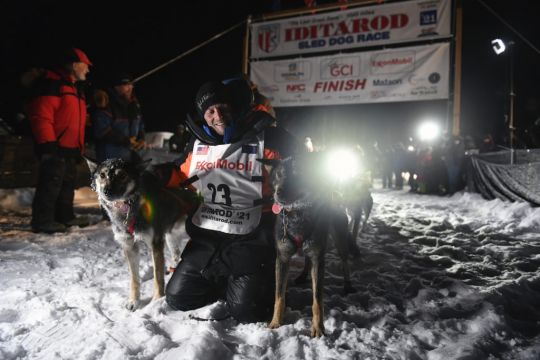Dallas Seavey has won the pandemic-shortened Iditarod Trail Sled Dog Race, matching the most wins ever by a musher.
Seavey brought his 10 dogs across the finish line near the community of Willow, Alaska, with a healthy lead over the second place musher, Aaron Burmeister.
It was the fifth title for Seavey. He matched the five-win threshold that only one other musher has accomplished. Rick Swenson won his five titles between 1977 and 1991.
“It’s a big deal,” Seavey said at the finish line after a race official checked to make sure his sled was complete with a sleeping bag, axe, dog booties and other mandatory gear. His finish was televised state-wide.
Seavey said he did not allow himself to think about a fifth win while on the trail because he did not want to jinx it.

“That’s huge, man,” he said. “I looked up to the Iditarod champions my whole life and I’ve dreamed about this my whole life. And now to actually go from that, to see it happen, to realise that, that’s pretty cool.”
Seavey said he tries to give himself a little time after each win to revel in it, but then it’s time to focus on the next thing, whatever it is.
“Whatever you’re doing, give it your whole attention and we’ll dwell on the records or the numbers when we’re too old to keep doing it. That’s the time to look back at it,” he said. “But right now, I want to keep moving.”
It is also a triumphant return for Seavey. Aged 34, many believe he could one day become the Iditarod’s greatest champion. His official winning time was seven days, 14 hours, eight minutes and 57 seconds.
Seavey previously won four titles in a five-year span, starting in 2012. He last raced in 2017 after Iditarod officials said four of his dogs tested positive for a banned opioid painkiller.
At the time, he vehemently denied giving his dogs any painkillers. A year later, the Iditarod reversed course and cleared Seavey of any wrongdoing.
But he sat out the race until this year, choosing to compete with his dogs in Europe instead.
2021 Iditarod Champion Dallas Seavey, with lead dogs North and Gamble! pic.twitter.com/ELyRKI7tyo
— Danny Seavey (@DannySeavey) March 15, 2021
This year’s Iditarod had a route change and was shortened to about 850 miles because of the pandemic.
The Iditarod began on March 7 with 46 mushers who bypassed most rural Alaska villages that normally serve as checkpoints as a Covid-19 safety precaution, leaving the competitors to sleep in tent camps outside towns or under the stars in temperatures that have reached minus 48C.
Mushers started the race near Willow, about 50 miles north of Anchorage. From there, they travelled to the ghost town of Iditarod and then turned back around to finish in Willow.
A normal race is about 1,000 miles and takes mushers across the wilds of Alaska from Willow to the finish line in Nome, on the state’s Bering Sea coast.
Seavey won just over 40,000 dollars and a snowmobile for winning the world’s premiere sled dog event, down about 10,000 dollars from what last year’s winner, Thomas Waerner of Norway, pocketed. Warner also won a new vehicle.
The overall purse was decreased by 20%, to 400,000 dollars, hurt by the loss of big name sponsors like Chrysler through an Anchorage dealership and Alaska Airlines.
The animal rights group People for the Ethical Treatment of Animals takes credit for sponsors dropping the race after the group staged protests outside corporate headquarters.







